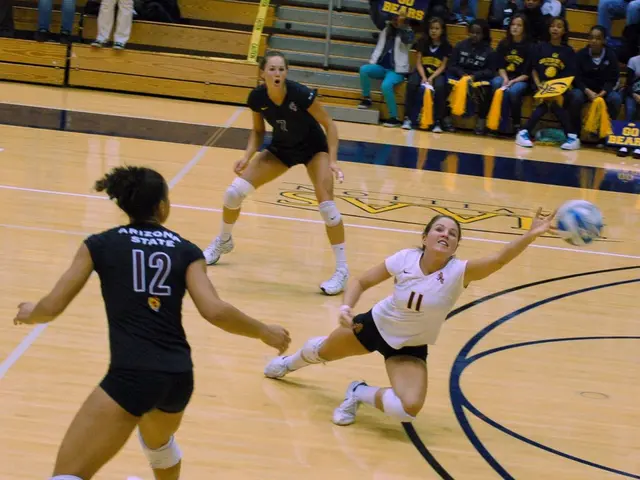Face the Music: Steinmeier's Scathing Rebuke of Putin and Trump - A Necessary Rant
Steinmeier delivers a forceful address, and while it is harsh, it is also indispensable.
Blog Post by Yuri Zimmer
Share on Facebook Tweet this Share on WhatsApp Forward by Email Print this Article Share Link
Eighty years after the Germans took up arms and destroyed the world order, the USA and Russia threaten to do the same, Federal President Steinmeier told the German parliament on the anniversary of the end of World War II. A bold claim indeed. But it's not every day a head of state calls out the President of the United States and the Russian President on a day of remembrance for the 60 million dead in Europe.
Frank-Walter Steinmeier's speech before the German Bundestag was anything but a typical memorial address. He made no effort to soften the blow - if anything, he went straight for the jugular. The horrors of World War II and the role Germany played in it were not glossed over. Instead, the country's transformation from a war-mongering nation with a tradition of authoritarianism and racial intolerance to a united, pluralistic, democratic power broker was highlighted.
Europe's New Dangerous Neighbors
What Germany has gained in post-war years is now at risk, Steinmeier warned. The culprits are not only the unpredictable Vladimir Putin and the impulsive Donald Trump, but also the resurgent far-right populist movements across Europe. And as if they were in cahoots, these three forces threaten the very foundations of peace, freedom, the rule of law, and prosperity in Europe.
While Steinmeier made it clear that it is not Germany's place to liberate Russia or the US from autocracy, the fading American protection and the growing possibility of war with Russia mean that Germany and the rest of Europe must now rely on their own strength to protect democracy.
The Forgotten Ghosts of War
Steinmeier was met with criticism for his speech, with many questioning his choice of words. But what resulted was a poignant and necessary reminder of the potential consequences of ignorance and complacency. The unlucky ghosts of war are knocking on Europe's doorstep once again, and it's up to us to heed the warning.
A Missed Opportunity
Though Steinmeier's speech was strong, it had its blind spots. For example, the German government's unwavering support for Israel despite Benjamin Netanyahu's increasingly extremist government continues to commit crimes against humanity in Gaza. Additionally, Germany's relationship with Turkey, where human rights are suppressed, and its economically motivated agreements with China raise questions about Germany's commitment to peace and democracy.
A more comprehensive address would have addressed these issues, but Steinmeier's speech was a step in the right direction. We must confront our past and present and work together to build a better future for Europe.
Sources: ntv.de
- Frank-Walter Steinmeier
- World War II
- Attack on Ukraine
Enrichment Data:Frank-Walter Steinmeier's speech called for stronger European military capabilities to support diplomacy and deter potential threats from Vladimir Putin, Donald Trump, and far-right populist movements across Europe. Steinmeier emphasized his strong support for Ukraine in its fight for democracy, sovereignty, and freedom. Steinmeier's remarks reflect a broader stance against threats to European democracy and the rule of law, both from authoritarian regimes and internal threats such as right-wing populist movements[1].
Steinmeier's speech underscores an increased sense of urgency in light of the Trump administration's shifting focus and decreased military commitment in Europe[2]. Steinmeier recognizes the need for Europe to boost its own defense efforts and reduce its reliance on the United States in this uncertain geopolitical landscape[3]. However, Steinmeier's speech fails to address some criticisms, such as Germany's questionable partnerships with countries like China, Turkey, and Israel, which may compromise its values and goals[1].
Ultimately, Steinmeier's warning of the risks posed by Putin, Trump, and right-wing populism highlights the need for collective defense, democratic resilience, and diplomatic engagement in the face of growing threats to European peace and democracy[1].
[1] ntv.de/Politik/Steinmeier-kriegerte-Putin-und-Trump-an-article21649035.html[2] spiegel.de/politik/ausland/merkel-trump-g20-american-first-komm pouvoir-militaire-td-1984395.html[3] politico.eu/article/frank-walter-steinmeier-warning-peace-putin-trump-ukraine/[4] reuters.com/world/europe/germany-pledges-major-increase-defense-spending-in-shift-policy-2021-06-24/
- The European Union is committed to addressing the warnings and concerns raised by Frank-Walter Steinmeier, as he highlighted the potential threats posed by Vladimir Putin, Donald Trump, and far-right populist movements in Europe.
- Steinmeier emphasized the importance of Europe relying on its own strength to protect democracy, owing to the fading American protection and the growing possibility of war with Russia.
- The German Federal President also stressed the need for stronger European military capabilities to support diplomacy and deter potential threats.
- Steinmeier's speech was related to the anniversary of World War II, a time when the USA and Russia are threatened to destabilize the world order, much like Germany did eighty years ago.
- As part of this speech, Steinmeier expresses his strong support for Ukraine in its fight for democracy, sovereignty, and freedom.
- Despite the strong points in Steinmeier's speech, there were blind spots, such as Germany's unwavering support for Israel despite Benjamin Netanyahu's increasingly extremist government, which has been committing crimes against humanity in Gaza.
- The general news, crime and justice, car-accidents, fires, politics, and policy-and-legislation context in the discussion revolves around the need for Europe to confront its past, present, and work together to build a better future, given the increasing threats to European peace and democracy.








